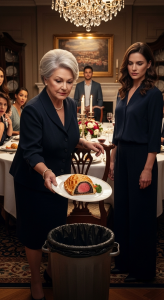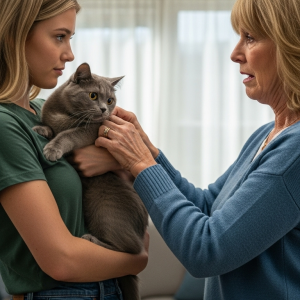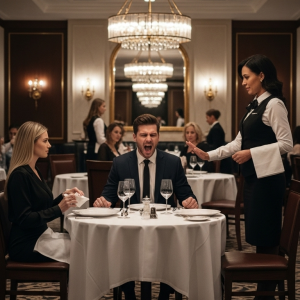The ghost of Arthur Thompson was a benevolent presence in his son’s home, his memory a warm and gentle thing. It was the first anniversary of his passing, and his daughter-in-law, Anna, was cooking in his honor. The ghost of her mother-in-law, Carol, however, was very much alive and currently holding court in the kitchen, a glass of chardonnay in one hand and a running commentary of unsolicited advice on her lips.
“You’re scoring the pastry too deeply, dear,” Carol said, peering over Anna’s shoulder at the magnificent Beef Wellington she was preparing. “As the great Julian Croft always says, the integrity of the puff pastry is paramount. It requires a delicate, disciplined hand. One must respect the classics.”
Anna just smiled, a small, tight smile that didn’t reach her eyes. For the ten years she had been married to Mark, she had endured Carol’s culinary critiques. Her own cooking, which was creative and modern, was always deemed “too fussy” or “lacking in traditional foundation.” Carol, a woman whose own culinary repertoire consisted of three casserole recipes from the 1970s, considered herself the sole arbiter of taste in the family, her opinions bolstered by a near-religious devotion to the celebrity chef Julian Croft and his hit TV show, “America’s Next Culinary Star.”
“Arthur, bless his simple heart, would eat anything you put in front of him,” Carol continued, oblivious to the storm brewing behind Anna’s calm facade. “But this dinner is for his memory. It should be perfect. I do hope it’s not too… experimental.”
Anna thought of Arthur. She remembered him sitting in this very kitchen, his eyes lighting up as he tasted one of her early, daring creations. “Don’t you ever let anyone tell you you’re not good enough, Anna,” he had said, his voice a warm, conspiratorial rumble. “This right here… this is real talent. One day, the whole world is going to see it.” His faith in her was a secret, precious memory that she held close, a shield against her mother-in-law’s constant barrage of subtle and not-so-subtle condescension. Arthur had been her only ally.
For the past three months, Anna had been living a double life. To her family, she was attending an “intensive weekend culinary course” in the city, a plausible excuse for her regular absences. Her husband, Mark, a man who loved his wife but had long ago learned that appeasing his mother was the path of least resistance, had been vaguely supportive. “That’s great, honey,” he’d said. “Maybe you’ll finally learn how to make a pot roast Mom will approve of.”
The reality was far more intense. Under her maiden name, Anna Miller, she had been a contestant on the latest season of “America’s Next Culinary Star.” She had endured the grueling 18-hour days, the relentless pressure of the mystery box challenges, the withering critiques of the judges, and the sharp-tongued, brilliant pronouncements of the man her mother-in-law worshipped: Chef Julian Croft.
She had not just survived; she had thrived. Her creativity, the very thing Carol dismissed as “fussy,” had been celebrated by the judges as innovative and bold. Her discipline, honed by years of patient practice in her own kitchen, had seen her through the most difficult technical challenges.
The finale had aired just last week. The final challenge: take a classic, storied dish and elevate it to a new level. Anna had chosen Beef Wellington, Arthur’s favorite. She had poured every ounce of her skill, her love for him, and her secret, burning ambition into that dish. She had presented it to the judges, her heart hammering, and had watched as the notoriously hard-to-please Julian Croft took a bite, closed his eyes for a long moment, and then looked directly at her. “Perfection,” he had declared. “Absolute perfection.”
She had won. The title, the quarter-million-dollar prize, and one other, very special perk: the right to have Chef Julian Croft personally cater one private event of her choosing. She knew immediately what that event would be. The final, crucial piece of her plan had just clicked into place.
The anniversary dinner was a somber, elegant affair. The extended family gathered in the formal dining room, the air thick with memories of Arthur. Anna moved with a quiet, graceful efficiency, her heart a calm, steady drumbeat. This was her arena now.
She presented the main course with a simple announcement. “In honor of Arthur, I’ve made his favorite. Beef Wellington.”
She sliced into the perfectly golden-brown pastry, revealing a cross-section of tender, pink fillet, a rich layer of mushroom duxelles, and prosciutto, all cooked to utter perfection. A murmur of appreciation went through the room.
She served Carol first. The older woman picked up her fork and knife with the theatrical gravity of a surgeon about to perform a critical operation. She took a small, delicate bite, chewed it slowly, and then, her face contorted into a mask of dramatic disgust.
“Oh, dear,” she said, placing her fork down with a loud clatter that silenced the table. “This is… simply inedible.”
Mark froze, a deer in the headlights. The other relatives exchanged awkward, uncomfortable glances.
“It’s dry,” Carol declared, her voice rising, now performing for the entire room. “The pastry is soggy on the bottom. The entire thing is an amateurish, failed attempt at a classic dish it clearly doesn’t understand.” She stood up, her eyes flashing with a cruel, self-righteous fire. “This is not a tribute to my husband. It is an insult to his memory!”
And then, in a move of such breathtaking audacity that it left the entire room speechless, she picked up her plate, marched to the corner of the dining room where a waste bin had been discreetly placed for scraps, and scraped the entire, perfect portion of Beef Wellington into the trash. She returned to her seat, her face a mask of tragic, violated dignity.
The silence that followed was so profound, so absolute, that the sound of a single, polite cough from the kitchen doorway seemed as loud as a gunshot.
A man stood there, leaning casually against the doorframe, a glass of red wine in his hand. He was tall, impeccably dressed, with silvering hair and eyes that held a familiar, sharp intelligence. It was Chef Julian Croft.
Carol’s jaw dropped. “Chef… Chef Croft?” she stammered, her face a comical mixture of shock and star-struck adoration. “What… what are you doing here?”

“A fascinating question,” Croft said, his famous, clipped British accent cutting through the tense air as he strolled into the room. “I’m here as part of a contractual obligation. But what you’re doing is far more interesting.”
He walked not to the table, but to the large, beautiful platter of Wellington that still sat on the sideboard. He picked up a clean fork and, with an expert’s touch, cut a small piece from the end slice. He placed it in his mouth, chewed thoughtfully, and then looked directly at Carol, his expression unreadable.
“Madam,” he began, his voice dangerously quiet. “I have built a global reputation and a multi-million-dollar career on my palate. My opinion on food is, to put it mildly, trusted. And my opinion is this…”
He paused, letting the entire room hang on his next words.
“This ‘amateurish’ Beef Wellington, a piece of which you just scraped into the bin like common garbage, is not only technically flawless—the pastry is a perfect, golden cage, the duxelles are a sublime umami symphony, and the temperature of the fillet is a textbook medium-rare—it is, in fact, the very dish that compelled me, on national television last Tuesday, to award its creator the title of ‘America’s Next Culinary Star’ and a check for a quarter of a million dollars.”
The collective gasp from the family was audible. Mark looked as though he had been struck by lightning. Carol’s face had gone from shocked to utterly, ghastly white.
Croft’s eyes, now cold as steel, bored into her. “The dish you called an insult is, in my professional and unwavering opinion, a masterpiece. One of the top five Wellingtons I have had the pleasure of tasting in my entire career.”
Carol, sputtering, looked from the chef, to the Wellington, and finally to her daughter-in-law. “Anna… Miller?” she whispered, the name a strangled, disbelieving sound.
Chef Julian Croft allowed a small, lethal smile to touch his lips. He raised his wine glass in a toast to the woman standing silently by the sideboard. “You may know her by another name,” he said. “But the world is about to know her as a champion.”
The implosion of Carol Thompson’s world was a quiet, devastating affair. There were no more arguments, no more drama. The dinner party ended in a flurry of mumbled excuses and awkward, hasty departures, leaving Carol alone at the long dining table, a queen deposed in a kingdom of her own making, silenced by the verdict of her own god.
The conversation between Mark and Anna later that night was the most honest they’d had in years. The shock had acted like a defibrillator on their marriage, jolting it back to life. He was horrified, ashamed, and for the first time, saw the true depth of his mother’s toxicity and the astonishing, hidden strength of his wife. The apology he offered was profound and sincere. For the first time, he was not a son caught between two women; he was a husband, standing firmly, proudly, beside his wife.
The happy ending for Anna was not just the vindication, as sweet as it was. It was the beginning of her real life. Chef Croft, deeply impressed by her talent and her quiet, steely grace under pressure, reiterated an offer he had made off-air. “That cookbook we discussed,” he’d said to her before leaving that night. “The offer stands. And I believe we should add a chapter: ‘How to Deal with Difficult Dinner Guests.’”
With the prize money, her newfound fame, and Mark’s unwavering support, Anna left the world of home cooking behind. Six months later, she opened a small, elegant restaurant in a cozy, tree-lined neighborhood. It was an instant, roaring success, booked solid for months, celebrated for its innovative, heartfelt cuisine.
She named it “Arthur’s Table.”
It was a tribute to the man whose quiet belief had been the secret ingredient in her success all along. The restaurant was her sanctuary, a place built not on revenge, but on a deep, abiding love for her craft. She had taken the bitterness and scorn of her mother-in-law and had used it as fuel, transforming the heat of that fire not into an act of destruction, but into a forge, from which she had emerged, brilliant, strong, and finally, free. She had found her voice, not in shouting, but in the quiet, undeniable perfection of a dish served with love.
Of course. Here is a 1000-word continuation of the story, exploring the profound consequences of that unforgettable dinner and the new world that Anna built from its ashes.
The silence that followed the dramatic exit of the dinner guests was unlike any Anna had ever experienced in that house. It wasn’t the tense, fragile silence of a truce; it was the clean, quiet emptiness after a storm has passed, washing the air clean. Mark stood frozen in the middle of the dining room, looking at the plate of perfect Beef Wellington his mother had dumped in the trash, as if it were the wreckage of his own life.
He finally looked at Anna, and for the first time, she saw him not as a son caught between loyalties, but simply as a man looking at his wife. The shame and regret in his eyes were profound. “Annie,” he whispered, using a nickname he hadn’t used in years. “I am so, so sorry. I let her… I let this go on for so long. I saw her little cruelties, her manipulations… and I told myself it was just ‘Mom being Mom.’ I never realized the scale of it. And I never, ever realized the scale of you.”
That night, a fundamental shift occurred. The fault line that had run through their marriage, with him on one side and his mother, and her on the other, simply vanished. They became a single, solid landmass. A team.
In the months that followed, Mark became her fiercest champion. He took his business acumen, the very thing his family prized, and put it entirely at her service. He helped her navigate the complex legalities of incorporating a business, negotiated the lease on a beautiful, overlooked property in a historic neighborhood, and secured financing with the confident zeal of a man on a mission of redemption.
The phone calls from Carol still came, but they were different now. Her initial screaming rage had given way to wheedling, manipulative pleas. “Mark, darling, all of our friends are talking,” she’d said in one call. “They think Chloe is being cruel, flaunting this silly contest win. You need to tell her to be more discreet. It’s embarrassing for the family.”
The old Mark would have equivocated, would have tried to appease her. The new Mark was polite, but his voice was made of steel. “Mom, Anna isn’t being indiscreet, she’s being successful. Her name is Anna, not Chloe. And she’s not ‘flaunting’ anything. She’s building a career. I’m incredibly proud of her. If our friends have a problem with that, then they’re not very good friends, are they?” He ended the call, leaving a stunned silence on the other end of the line. Anna, who had overheard, felt the last of her own resentments towards him melt away. He was finally, truly, her partner.
“Arthur’s Table” opened six months later. It was everything Anna had ever dreamed of. The space was intimate and warm, with reclaimed wood tables, soft lighting, and an entire wall dedicated to a beautiful, hand-painted mural of the English countryside, a nod to Arthur’s love for the classics. It was a restaurant built on a philosophy of respect—respect for the ingredients, for the staff, and for the guests.
It became the most celebrated restaurant opening of the year. The city’s top food critic, a man whose review could make or break an establishment, wrote a piece that was less a review and more a love letter.
“One does not simply eat at Arthur’s Table; one feels as though they have been welcomed into a home,” the review began. “Chef Anna Miller, a talent of astonishing poise and creativity, cooks not merely to impress, but to nurture. Each dish… is a story, a memory, a perfectly executed act of love. This is not just the best new restaurant in the city; it is, perhaps, one of the most honest.”
On the evening the review was published, the restaurant was buzzing with a special energy. Chef Julian Croft sat at a corner table with Mark and Anna, celebrating. He had become a genuine friend and mentor, a partner on the cookbook they were now co-authoring.
“I told you they’d understand,” Julian said, raising his glass to Anna. “Authenticity is the one ingredient that can never be faked. You have it in spades, my dear. Your father-in-law would be immensely proud.”
Mark reached across the table and took his wife’s hand. “He would be,” he said, his voice thick with emotion. “He always knew. He was the only one who really saw her.” He looked at Anna, his eyes full of a love that was now deeper and more real than it had ever been. “Now the whole world can see her too.”
A year after that fateful dinner, Carol’s world had shrunk considerably. Her social standing, once her most prized possession, had been irrevocably damaged. She had been exposed not just as a poor judge of food, but as a cruel and petty woman. Her friends were polite, but distant. The invitations to sit on charity boards had dried up. She was a punchline she was never in on.
It was her own birthday, and Mark had insisted she join them for a quiet dinner at “Arthur’s Table.” She had agreed, unable to refuse without causing another, now unwinnable, fight. She sat stiffly in the warm, bustling restaurant, a ghost at a feast she could no longer critique. The food was, to her immense frustration, undeniably exquisite.
Anna approached the table, not as a daughter-in-law, but as the gracious, professional owner. “Is everything to your liking, Carol?” she asked, her voice polite, calm, and completely devoid of any emotional charge.
Carol looked up at the woman her son now adored, the woman the entire city celebrated, the woman who had built this empire from the ashes of her scorn. “It’s… very nice, dear,” she said, the words costing her a visible effort. It was not an apology, but it was a surrender. It was the quiet, bitter admission of her complete and utter defeat.
Anna simply nodded and moved on to the next table. She didn’t need an apology. She didn’t need anything from Carol at all. She was too busy living a beautiful life, a life built on her own talent, a life shared with a husband who finally saw her clearly, a life that was the most fitting tribute to the man who had always believed in her. The best revenge, she had learned, wasn’t a dish served cold. It was a restaurant, fully booked, serving it warm.




